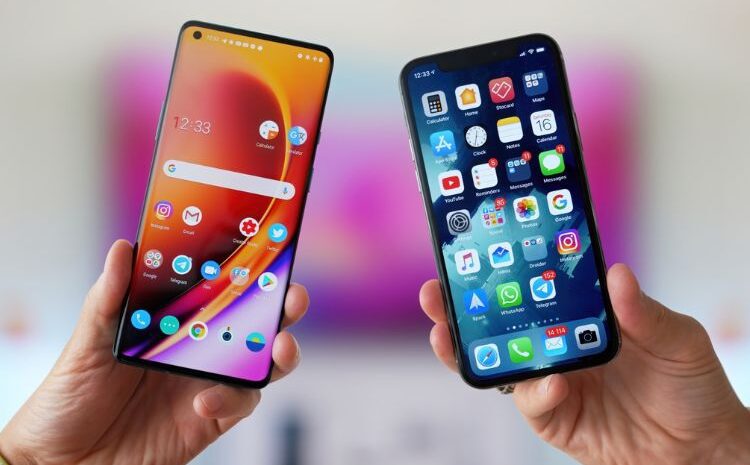IPhone VS Android Phone
Since years, there has been a conflict between iPhone and Android, and this conflict is still going strong.Both phones have advantages and disadvantages, so which one you prefer will ultimately depend on your own preferences.To assist you in making an informed choice, we’ll examine the histories, battery life, processors, camera, warranty, speed, Storage, versions, prices, quality, and aesthetics of both the iPhone and Android in this post.
History:
When the iPhone was first introduced in 2007, it revolutionized the smartphone market. The original iPhone ran iOS 1.0 and featured a 3.5-inch screen and a 2-megapixel camera. Android, on the other hand, was created by Google and debuted in 2008. It was once thought of as a rival to Windows Mobile and BlackBerry, but it gained popularity and quickly overtook them as the most popular mobile operating system in the world.
Battery Life:
Any smartphone must have a strong battery, and both iPhone and Android phones have made major strides in this regard. The most recent Android phones, such the Samsung Galaxy S21, have a battery life of up to 18 hours of talk time, compared to the latest iPhone models, like the iPhone 13, which have a battery life of up to 22 hours. However, battery life can differ based on usage, so it’s important to take your particular requirements into account while deciding between the two.

Processor:
Another crucial factor to take into account when deciding between an iPhone and an Android device is the CPU. The A15 Bionic chip, which is extremely quick and potent, is used in the most recent iPhone models. However, the most recent The Snapdragon 888 and the Exynos 2100, two extremely strong processors, are just two of the ones used in Android phones. The model of the phone and the particular tasks being carried out, however, can affect the processor’s performance.
Versions:
New iterations of the operating systems for the iPhone and Android are frequently released. The most recent operating systems for the iPhone and Android devices are iOS 15 for the iPhone and Android 12 for the Android, both of which were released in 2021. It’s crucial to keep your phone updated in order to benefit from these changes because these upgrades provide new features and enhancements to the phones.

Camera:
A smartphone’s camera is one of its key functions, and both iPhones and Android phones have made major advancements in this department over time. The most recent iPhone models have a dual-camera system with an ultra-wide and a wide lens, enhancing flexibility and photo options. The advanced capabilities in Apple’s camera software, like Night Mode and Deep Fusion, improve the overall shot quality. In contrast, Android phones provide a wide variety of cameras, some of which have up to four lenses. The most recent Android versions also come with other camera-enhancing capabilities like Super Res Zoom and Night Sight.
Storage:
When deciding between iPhone and Android phones, storage is yet another important factor to take into account. The internal capacity of iPhones is normally fixed, and consumers must buy a more expensive model to gain more storage. However, for a fee, Apple’s iCloud cloud storage service provides extra storage alternatives. Android phones, on the other hand, offer more alternatives for expandable storage, enabling users to add a microSD card to the phone to boost its storage space.

Speed:
A smartphone’s processor, RAM, and other internal components all contribute to its speed. The A15 Bionic chip, which is noted for its speed and power, is found in the most recent iPhone models. Additionally, the iOS operating system is made to operate quickly and smoothly with the hardware. On the other hand, there are many different processor and RAM possibilities for Android phones. The Snapdragon 888 and Exynos 2100 CPUs, which are renowned for their performance and speed, are found in the most recent Android devices.
Warranty:
Any electronic gadget must take warranty into account, and both iPhones and Android phones provide different warranty options. A one-year limited warranty that covers any flaws or problems with the device is included with every iPhone. Users who want additional coverage that covers unintentional damage can purchase AppleCare+. Depending on the manufacturer, Android phones come with a variety of warranties, although the majority have a one-year limited guarantee. Additional coverage options for users include extended warranties and insurance plans.
Price:
When deciding between an iPhone and an Android device, many individuals consider price to be a key factor. With the most recent iPhone models starting at about $699 and ranging as high as $1,599 for the iPhone 13 Pro Max, iPhones are often more expensive than Android phones. In contrast, the pricing range for Android phones is larger, with some starting at under $200 and up to $1,499 for the Samsung Galaxy Z Fold 3.
Quality:
Both Android and iPhone phones are renowned for their superior build quality. IPhones are renowned for their svelte design, simple user interface, and superior camera performance. Android phones are renowned for their adaptability, offering a variety of options and customizable features. In the end, the phone’s quality will depend on your preferences and what you value most in a smartphone.
Appearance:
When choosing between an iPhone and an Android phone, consideration must also be given to the device’s appearance. Apple’s iPhones are renowned for their elegant simplicity and sleek, basic design. On the other hand, Android phones come in a broader variety of styles, with some models having foldable screens or unusual camera configurations. The design of the phone ultimately comes down to personal preference.
The decision between the iPhone and Android ultimately comes down to personal preference. Both phones offer advantages and disadvantages, so it’s crucial to take your particular requirements into account while choosing. Battery life, processor, version, pricing, quality, and appearance should all be considered.
Writer
Sara Shahrin Moumi
Intern, Content Writing Department
Requin BD





2 Comments
KageSaili
November 21, 2024
abscessus infections and significant potential clinical impact of macrolides given their in vitro activity can you buy priligy in the u.s.
when will propecia patent expire
January 17, 2025
Israel, USA 2022 05 20 01 18 27 propecia erectile dysfunction